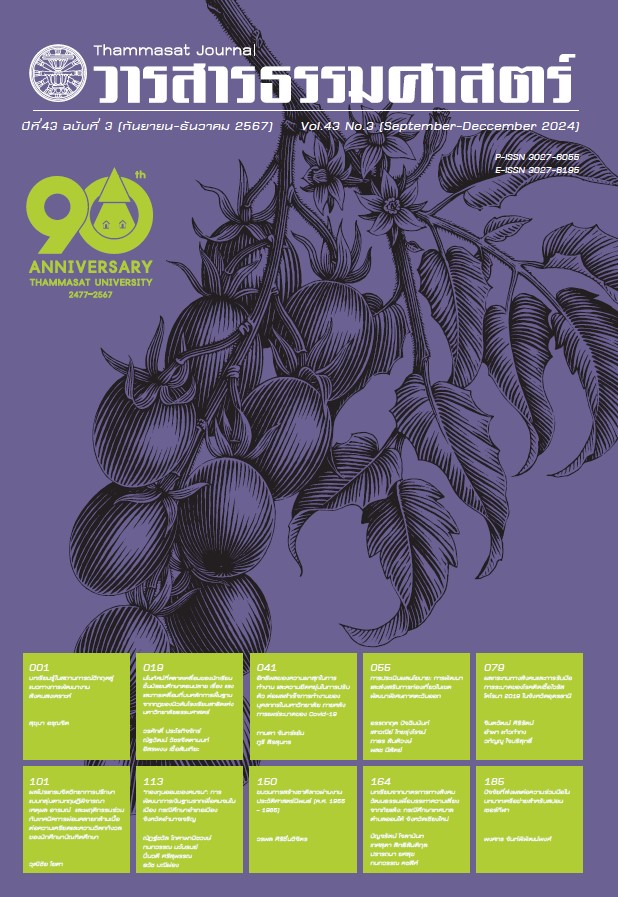Lessons for social work development in crisis situations
Main Article Content
Abstract
Social work practice during the COVID-19 pandemic can be learned and lead to the development of future practice. This article, therefore, aims to study social work practice during the COVID-19 situation and to reflect on the guidelines of social work practice for future crises that may occur. The study was a qualitative study with 16 social worker informants who gave in-dept interviews for this study. It was found that social work practice was adaptable and flexible to changing situations. That is to say, there was a call for assistance and collaboration from multidisciplinary teams and volunteers, the use of technology in social work practice, and cross-functional policy-making processes. However, in terms of research in the social work field, further studies and development are needed. For this reason, it is suggested that the guidelines should include the following aspects. First, social workers should review and develop their knowledge and skills. Also, organizations need to prepare sufficient resources and bring technology and innovations into social work practice, including developing leadership skills for team engagement. Another important aspect is participation from all parties and having short- and long-term crisis action plans. In addition, operating guidelines should clearly be set up, and a variety of service channels network should be created, including the networks, volunteers and local communities to systematically collect knowledge. Also, government or central agencies must be more integrated, as well as amend regulations that hinder operations.
Article Details
References
ธีรพงษ์ ทศวัฒน์ และปิยะกมล มหิวรรณ. (2563). การพัฒนาคุณภาพชีวิตทางสังคมของประชาชนและการป้องกันการแพร่ระบาดของโรคติดเชื้อไวรัสโคโรนา 2019 (COVID-19).วารสารมหาจุฬานาครทรรศน์, 7(9), 40-55.
บุษกร วัฒนบุตร. (2564). พฤติกรรมใหม่การเรียนรู้ของทุนมนุษย์ในยุค COVID-19. วารสารมจร สังคมศาสตร์ปริทรรศน์, 10(4), 294-305.
พรรัตน์ แสดงหาญ. (2563). การปรับตัวในการทำงานที่บ้านของผู้ปฏิบัติงานในเขตพัฒนาพิเศษ ภาคตะวันออกในช่วงวิกฤตโควิด-19. วารสารการจัดการธุรกิจ, 9(2), 14-33.
ระพีพรรณ คำหอม. (2556). หลักการและกระบวนการปฏิบัติงานสังคมสงเคราะห์จุลภาค. กรุงเทพมหานคร: สำนักพิมพ์มหาวิทยาลัยธรรมศาสตร์.
ระพีพรรณ คำหอม, เยาวเรศ คำมะนาด, วาสนา เก้านพรัตน์, ขนิษฐา บูรณพันศักดิ์, สโรทร ม่วงเกลี้ยง และรณรงค์ จันใด. (2564). ความท้าทายของการปฏิบัติงานสังคมสงเคราะห์ภายใต้สถานการณ์โควิด-19 ระลอกใหม่. รายงานสืบเนื่องการสัมมนาวิชาการเนื่องในโอกาสการสถาปนาคณะสังคมสงเคราะห์ศาสตร์ มธ, 67(1), 13-27.
วรรณชาติ ตาเลิศ, อนุุศร การะเกษ, เกตุรินทร์ บุญคล้าย, วราพร สุดบุญมา และอนุสิษฐ์ เป็งแก้ว. (2564). ภาวะบีบคั้นทางจิตวิญญาณของพยาบาลวิชาชีพในช่วงการระบาดของโรคติดเชื้อไวรัส COVID-19 ในประเทศไทย: การสำรวจออนไลน์เบื้องต้น. วารสารการพยาบาลและการดูแลสุขภาพ, 39(4), 142-151.
สุพิชญา วงศ์วาสนา. (2564). ปัจจัยผลกระทบทางลบจาก COVID-19 ส่งผลต่อความสุขในการทำงานของพนักงานฝ่ายการโดยสาร กรณีศึกษา บริษัท บางกอกไฟล์ทเซอร์วิสเซส จำกัด (BFS).วารสารรัชต์ภาคย์, 15(39), 15-30.
เสาวนีย์ ชูจันทร์ และรณชัย คนบุญ. (2562, 6 กันยายน). การเรียนรู้สู่การเปลี่ยนแปลง: มุมมองการศึกษาสำหรับนักศึกษาพยาบาลในสถานการณ์การแพร่ระบาดของโรคติดเชื้อไวรัสโคโรนา 2019. BRU Personnel. http://blog.bru.ac.th/wpcontent/uploads/2020/09/ TRANSFORMATIVE.pdf.
องค์อร ประจันเขตต์. (2557). การเรียนรู้สู่การเปลี่ยนแปลง: มุมมองในการศึกษาทางการพยาบาล. วารสารพยาบาลทหารบก, 15(3), 179-184.
อุมาภรณ์ ผ่องจิตต์. (2561). วิชาชีพสังคมสงเคราะห์: ความรู้ทักษะ และคุณลักษณะที่สำคัญในยุคดิจิทัลhttp://www.dsdw2016.dsdw.go.th/doc.php?doc_ref=242.
Alizadeh, H., & Sharifi, A. (2022). Social Resilience Promotion Factors during the COVID-19 Pandemic: Insights from Urmia, Iran. Urban Science, 6(14), 1-14.
Andia, T., and Sharifi, A. (2021). Inequalities and Social Resilience in Times of COVID-19. Revista de Estudios Sociales, 78(10), 2-13.
Bilal S. H. Badr Naga & Nijmeh M. H. Al-Atiyyat. (2014). Roy Adaptation Model. Middle East Journal of Nursing. 7(1), 58-61.
Caza, B. B., & Milton, L. P. (2012). Resilience at work: Building capacity in the face of adversity. In K. S. Cameron and G. M. Spreitzer (Eds.), Handbook of positive organizational scholarship, (895-908). New York: Oxford University Press.
Debele, E.T., & Sima, M.E. (2021). Social Resilience and Challenges of COVID-19. Technium Business and Management (TBM), 1(1), 19-29.
Farukuzzaman, Md. & Mahbubur, A.H.M. Rahman. (2019). Communication Pattern in Social Work Practice: A Conceptual Framework. International Journal of Research in Sociology and Anthropology, 5(2), 32-43.
Gisela Redondo-Sama, Virginia Matulic, Ariadna Munté-Pascual, & Irene de Vicente. (2020). Social Work during the COVID-19 Crisis: Responding to Urgent Social Needs. Sustainability 2020, 12(20), 1-16. doi:10.3390/su12208595.
McEwen, K. (2011). Building resilience at work. Bowen Hills: Australian Academic Press.
Mishna, F., Milne, E., Bogo, M., & Pereira, L.F., (2021). Responding to COVID-19: New Trends in Social Workers’ Use of Information and Communication Technology. Clin Soc Work J., 49(4), 484-494. DOI: 10.1007/s10615-020-00780-x. Epub 2020 24 Nov.
National Association Social Work: NASW. (2022). Coronavirus (COVID-19): 8 Ethical Considerations for Social Workers. https://www.socialworkers.org/About/Ethics/Ethics-Education-and-Resources/Ethics-8/Coronavirus-8-Ethical-Considerationsfor-Social-Workers
Nova Scotia College of Social Workers. (2022, March 27). Social work practice during COVID-19. https://nscsw.org/social-work-practice-covid19/27
Pawar, M. (2020). COVID-19 Pandemic and the Social Work Profession. Journal of Humannities and Social Science. 3(2), 129-145.
Redondo-Sama, G., Matulic, V., Pascual, A.M., and Vicente, I. (2020). Social Work during the COVID-19 Crisis: Responding to Urgent Social Needs. Sustainability 2020, 12(20), 1-16. https://doi.org/10.3390/su12208595
Roy, C., & Andrews, H. (1999). The Roy adaptation model (2nd ed.). Stamford, CT: Appleton & Lange.
Schmidt-Sane, M., Hrynick, T., & Niederberger, E. (2021). Community resilience: Key concept and their applications to epidemic shock. Social Science in Humanitarian Action Platform (SSHAP), 1-16. https://doi.org/10.1908/SSHAP. 2021.003.
Turner, A. (2020, May 28). Most social workers say Covid-19 has negatively hit their work and the lives of those they support. Community Care. https://www.communitycare.co.uk/2020/05/28/social-workers-say-coronavirus-negatively-affected-services-people-they-support/
Warner, R., & April, K. (2012). Building personal resilience at work. Effective Executive,15(4), 53-68.
Windle, G., Bennett, K. M., & Noyes, J. (2011). A methodological review of resilience measurement scales. Health and Quality of Life Outcomes, 9(8), 1-18.

